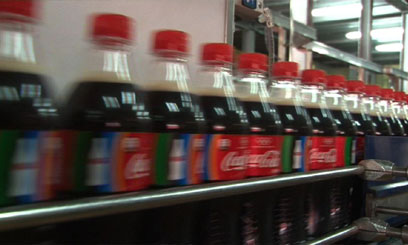
PET sales grew by 30 percent last year alone, primarily driven by consumers’ need for convenience/FELIX MAGARA
NAIROBI, Kenya, Jul 11 – Springing ahead of the growing demand for plastic bottled products, Nairobi Bottlers Limited (NBL) has commissioned a Sh1.3 billion PET (plastic bottles) manufacturing line at its plant in Embakasi.
PET sales grew by 30 percent last year alone, primarily driven by consumers’ need for convenience, with most opting for plastic bottles instead of the conventional glass bottles.
“PET has been the engine of our growth over the last two years. We reached our maximum capacity in December last year and couldn’t grow as fast as we planned. We invested three or four years ahead of the demand,” Coca-Cola Sabco Country Manager Patrick Pech said.
NBL is gradually making a move to producing more plastic bottles, with 73 percent of its products packaged in glass bottles.
The new PET line is one of three in Kenya and produces 28,000 bottles per hour, more than doubling Nairobi Bottlers capacity to 12 million physical cases annually.
The capital investment is part of a larger Sh4.2 billion budget for the current financial year, which will seek to strengthen the company’s position and ability to serve ever growing consumer demand.
NBL is the sole national producer of PET bottled beverage products with a supply deficit, which forced the company to temporarily import Dasani from neighbouring Tanzania to satisfy consumer demand in the local market.
Coca-Cola Sabco Country Finance Manager Nick Macharia said the company has been very aggressive in investing ahead of capacity with several expansion plans in the pipeline.
“We are investing in our backward integration where we will start manufacturing our own pre-form bottles, which will cost about $10 million. Revamping our fleet is going to be another $2 million. We’ve opened a depot in Nakuru,” he said.
NBL plans to begin production of pre-forms in March next year; a move that was prompted by its current supplier, local firm Safepak’s, inability keep up with demand.
In addition, Coca-Cola Sabco will install a 36,000 bottle-per-hour line in Uganda next year to further boost capacity.
The expansion plans, however have not been short of a few hitches such as rising production expenses due to rising sugar and energy costs.
“The cost of sugar has increased by 10 percent in Dollar terms. Energy costs have gone up 35 percent from last year. We’ve tried to make sure our prices are below the rate of inflation to make sure our product is affordable, hence the investment in backward integration to pass the benefit to the consumer,” Macharia said.
Two weeks ago, Coca-Cola rolled back the price of its 300 milliliter drink from Sh25 to Sh23.
To ensure uninhibited production of about one million litres of beverages daily, NBL has petitioned Nairobi Water and Sewerage Company for a dedicated pipeline, which it had prior to the construction of the Eastern Bypass.
“We have two boreholes on site and source from Nairobi Water. There is an estate coming up and we are sharing the same water line. We invested in the largest water tank above ground in East Africa that holds a million litres, but it is only three days cover,” Macharia explained.
NBL is the largest of six producers of Coca-Cola beverages in the country accounting for approximately 50 percent of national production volume.


































